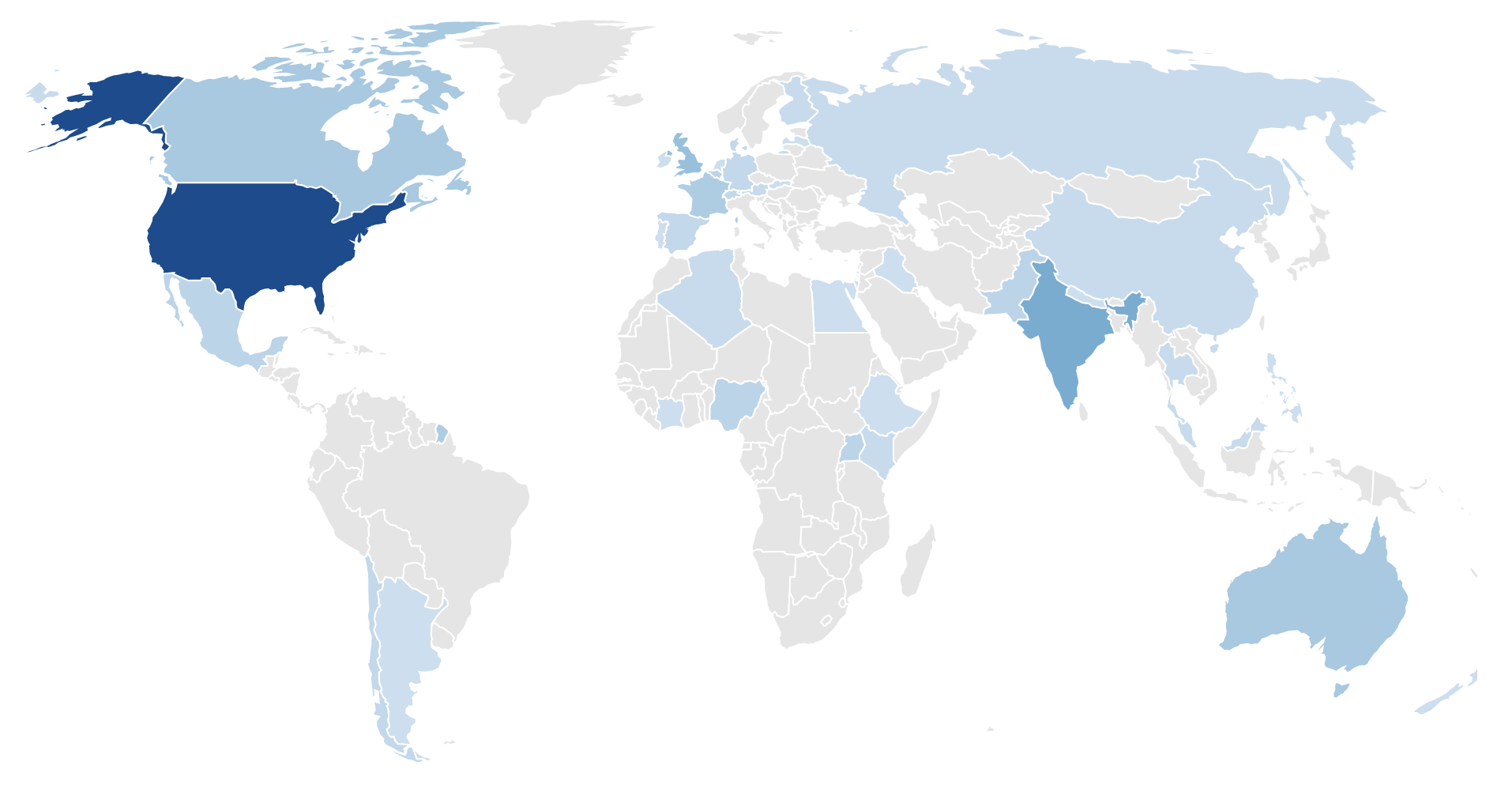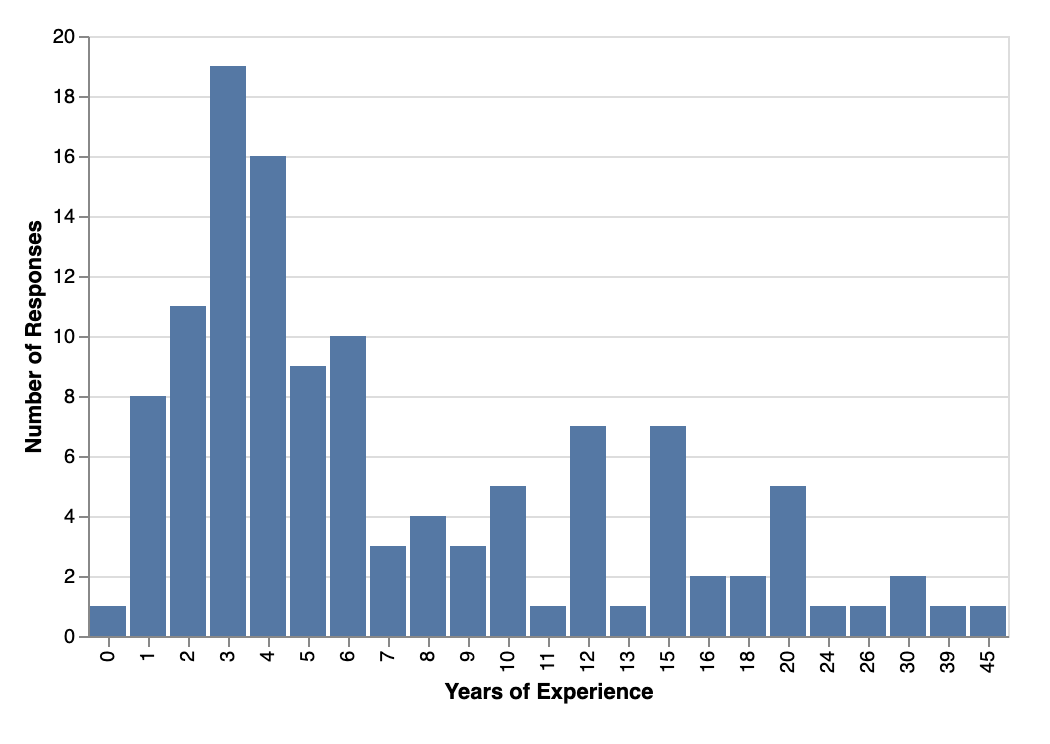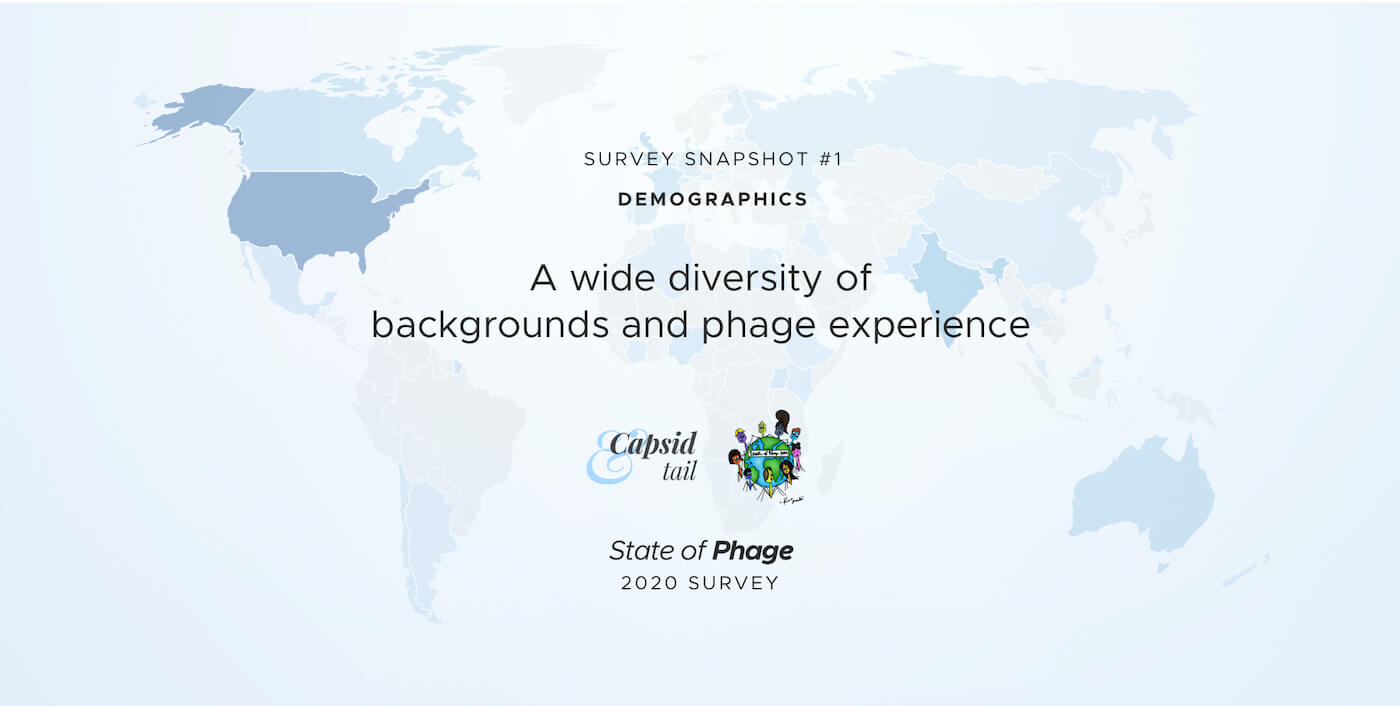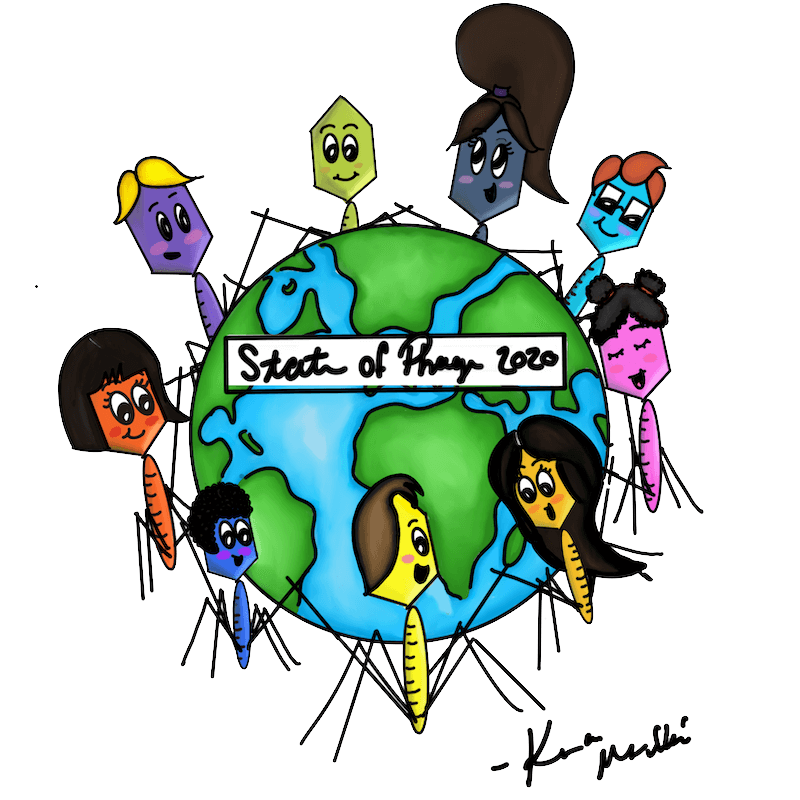It’s been almost three months since we launched our State of Phage 2020 Survey! We’re excited to show you a snapshot of the data coming in. For this snapshot, we’re focusing on the ‘who’, ie. who responded to the survey? What stage of career are they at, where are they located, and what level of phage experience do they have? In future issues, we’ll release more data, digging into the specific phage work being done, the methods being used, the phages and host strains people are collecting, where they get their strains and phages, where they like to publish, their thoughts on sharing and commercializing phages, and more!
A refresher: why we did this survey
The phage field is clearly growing around the world, but we realized that no one has collected a bird’s eye view of what everyone is working on. From our conversations with researchers, we believe that phage research activity and diversity of approaches is greater than the published literature would suggest. We created the State of Phage 2020 survey to fill this gap.
We hope it will help researchers learn more about how their phage research approaches compare with others around the world, and that it will help establish a baseline for the current state of phage research so we can collectively track how it grows and evolves over time. Check out https://survey.phage.directory for more info on the ‘why’ behind State of Phage 2020!
Our plans & hopes
This issue marks the beginning of a series that will wade through the data, looking at a different theme or two each time, but we’ll also publish a full report at the end of it all. We hope researchers will read it, learn lots about the field, and share it with others to inspire them to join the community and pursue their own phage research (or maybe fund it!).
Now, let’s dive in!
Who’s responded to the survey to date?
We’re thrilled to have received 120 full responses to our survey. Filling this thing out was no small feat, so thank you all so much for taking the time to let us know about the kind of phage work you’re doing!
Also, 52 people filled out part of the survey, but not the whole thing (yet) — a reminder; if this is you, you should still be able to head to https://survey.phage.directory and complete your responses! (Your browser should have saved your progress). There’s still time for you to be included in the final counts.
Phage labs are highly spread out, and phage ‘hotspots’ are emerging in at least a dozen countries
Of the 120 responses, we rarely had the same lab or organization respond twice! A whopping 117 came from unique labs, and 102 came from unique organizations (university, institute or company). This really gives a picture of how spread out phages labs are around the world, and it also points to phage being a priority at a huge number of separate organizations. 18 organizations did have two or more labs represented in our results, suggesting possible phage research “hotspots” beginning to form (or at least pockets of extra enthusiasm!). Our data points to these kinds of phage hotspots in the UK, France, Denmark, Belgium, India, Australia, Singapore, USA, Canada, Pakistan, Uganda, and Nigeria. Amazing!
Responses came in across all career stages
We asked about career stage, and found that about 1/3 are students (across undergrad, masters and PhD programs), with PhD students representing the majority (77% of all students). We had 17 postdocs respond to the survey, and 47 professors. Among professors, about half were early career professors, while the other half were senior professors. We also had 5 responses from government, and 7 responses from industry.
| Career Stage |
# |
| Undergraduate |
4 |
| Masters |
6 |
| PhD |
34 |
| Post-doctorate |
17 |
| Early-career Professors |
27 |
| Senior Professors |
20 |
| Government |
5 |
| Industry |
7 |
88% of respondents do academic research
We asked respondents about their job responsibilities. Most are performing academic research (105/120), while half report teaching (60/120). About 10% report industry research (13/120), and about a quarter reported that their responsibility was to be a student (29/120).
Phage research is being done on six continents
We asked where respondents’ phage research was predominantly being conducted (so this is not a nationality question; rather, it’s to show where phage labs are physically located).
Our 120 respondents are doing their phage research in 44 countries, shown here as a heat map showing relative number from each: a darker colour indicates more respondents from that country. We can see that the USA had the most respondents, followed by India, but that the rest of the respondents were spread out across the globe, covering all continents (except Antarctica — anyone want to head over there and start a phage lab?).

60% have 1-6 years experience, and 10% have been working on phage for 20-46 years!
We asked how many years people have been working with phages, and got quite a spread of answers! Here’s a graph showing number of responses for each number of years. We found that the bulk of respondents were relatively new to phage work, with 60% of respondents (73/120) having between 1-6 years phage experience. About 30% of respondents (35/120) had between 7 and 18 years phage experience, while around 10% (11/120) had worked with phage for 20-46 years! Incredible!

Isolating, characterizing, publishing on, and sharing phages
We wanted to get a sense of how many labs had taken part in isolating, characterizing, publishing on, and sharing phages (for research, for therapy, and commercially).
90% have isolated a phage, labs do a healthy mix of wet lab and bioinformatics, 70% have published
We found that isolating phages was the most commonly reported activity, with 88% reporting they’d isolated phages in their lab. Characterizing phages in the wet lab was also a popular activity (84%), with almost as many reporting genetically characterizing phages with bioinformatics (76%). 70% of respondents reported having published at least one phage paper or preprint.
| Experience |
% |
| Isolated phages |
88% |
| Characterized phages in a wet lab |
84% |
| Characterized or analyzed phages genetically with bioinformatics |
76% |
| Published a phage paper in a peer-reviewed journal or on a preprint server |
70% |
| Sent phages to other researchers |
52% |
| Prepared and purified phages for clinical / therapeutic use |
23% |
| Tested or shared your phages on behalf of a prospective phage therapy patient |
22% |
| Taught an undergraduate phage course that isn’t SEA-PHAGES |
18% |
| Deposited phages into a phage repository like ATCC or NCTC |
15% |
| Sold or licensed phages |
8% |
| Participated in SEA-PHAGES as a student |
6% |
| Taught SEA-PHAGES |
5% |
Half have shared phages with other researchers, nearly a quarter for phage therapy cases, and only 15% with repositories
As for sharing phages, the most popular type of sharing was sending phages to other researchers; half of respondents had done so. As for sharing phages for therapeutic use in a patient, we were very surprised to see that more than two dozen labs had tested, shared, and prepared their phages for clinical use. Contrary to our expectations, about the same number of labs that reported having tested their phages and shared them on behalf of a patient had actually also done the work of purifying their phages for clinical use. (Normally when we send phage alerts, far more labs volunteer to help in the initial phage host range testing phase than in the clinical purification phase, whereas this data suggests many more labs than we thought may be preparing purified clinical preps of their phages). Interesting!
Lastly, when it comes to depositing phages into repositories, like ATCC or NCTC, only 15% reporting having done so. This reflects what we’ve heard from those who manage these types of repositories; getting researchers to deposit their phages is a constant battle for them. (We’re working on ways to incentivize this in collaboration with repositories around the world, so stay tuned for that!)
Phage hunting courses: beyond SEA-PHAGES
We asked about the undergrad phage hunting courses respondents had taught. Surprisingly, far more labs report having taught a non-SEA-PHAGES undergraduate phage hunting course (22 respondents) than a SEA-PHAGES course (6 respondents). We didn’t realize there was so much phage hunting being taught outside of SEA-PHAGES — this is really exciting! (If anyone wants to email us and share more about the way they’re teaching their course, and which phage hosts they’re using in the classroom, we’d love to hear about the undergrad phage hunting operations you’re running! We’d love to better understand this area, and do what we can to support what you’re doing!)
Stay tuned for more!
That’s it for now! Stay tuned for future Capsid & Tail issues, where we’ll continue delving into the data that’s come in. We’re learning a lot about the phage field, confirming some suspicions of ours, and very much enjoying the surprises!
Your thoughts are always welcome
Anything you found surprising about this data? Do you have questions about how we’ve done our analysis? Do you think we’ve missed any interesting interpretations? Email us and share — we’d love to hear from you!
Thanks to Sheetal Patpatia for her work writing summaries for the What’s New and Jobs sections this week! It’s Sheetal’s first week as a volunteer, so she’s off to a great start! Welcome Sheetal!










